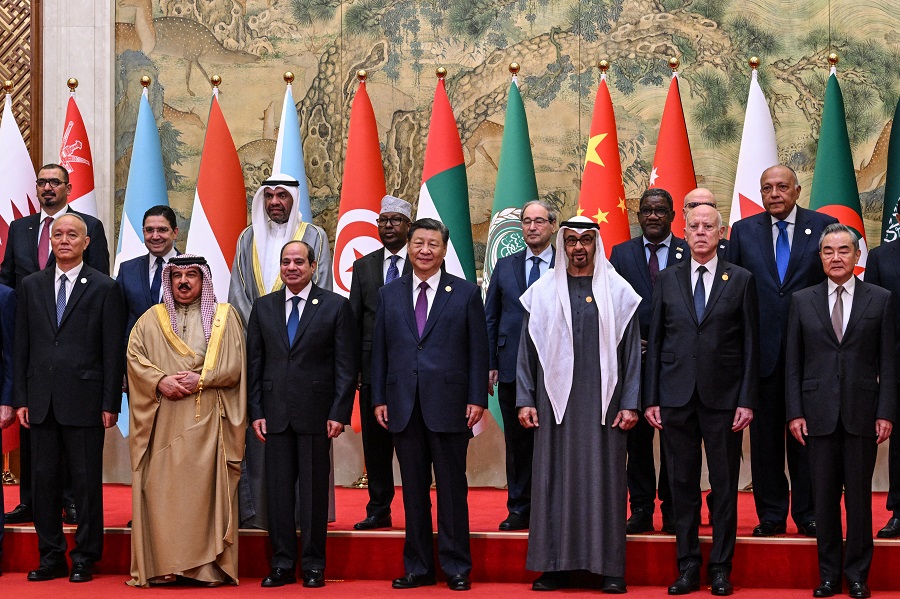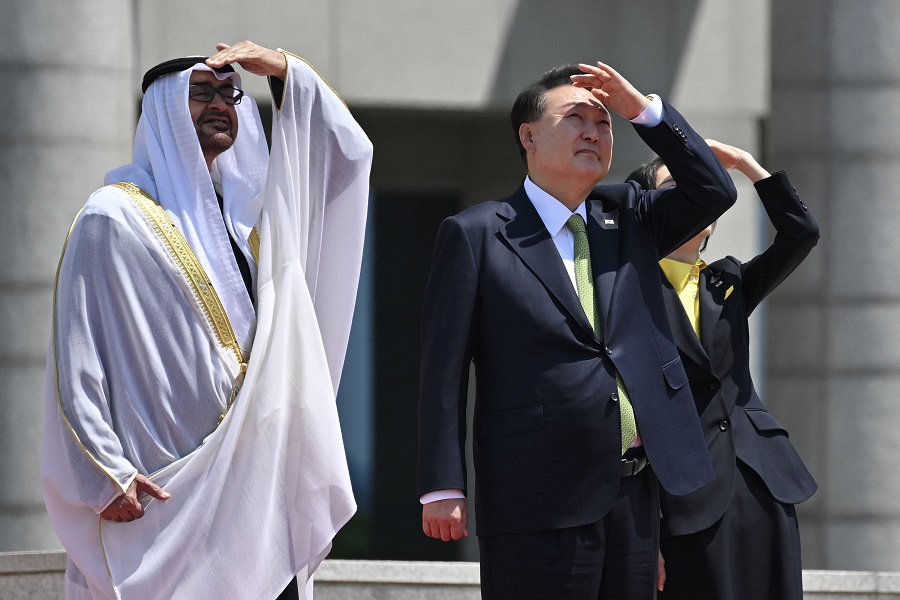Key Takeaways
|
The 10th China-Arab States Cooperation Forum (CASCF) which was held in Beijing in late May 2024 presented an opportunity to form more common stands and policies on Middle Eastern issues, especially the Gaza crisis and the Palestinian issue. As for image and narrative, this positions China differently from the US, which is perceived as biased toward Israel and has not shown sufficient seriousness and will to prevent Tel Aviv from committing catastrophic violence and bloodshed against the Gaza Strip and its inhabitants in an unprecedentedly inhumane way.
But, despite the negative reaction against the US over its support for Israel, the Gaza conflict has shown that Washington remains the pre-eminent foreign power in the Middle East. A year after brokering a deal between Iran and Saudi Arabia, Beijing has been on the periphery of negotiations over a Gaza ceasefire and has stayed on the sidelines, even at a time when a vital trade route through the Red Sea comes under fire, according to a report in the Wall Street Journal titled “China Wants a Bigger Role in the Middle East. But Not Too Big.”
China is Not a Substitute for the West
Despite the heated events in the Middle East, notably the war in Gaza, China has not positioned itself as an alternative to the West, nor does it appear to be presenting itself as such. However, China has been expanding strategic partnerships with regional countries, most recently with Tunisia, leading to growing and intertwined Chinese interests in the Middle East in recent years. This situation dictates that china must make extra efforts to ensure calm and stability in the region, viewing it as a higher interest for Beijing rather than merely a point in great power competition.
China’s mediation between Saudi Arabia and Iran and the expansion of the Shanghai Cooperation Organization (SCO) and BRICS are noticeable indications of the new dynamics involving diversity and overlap in the international landscape. These developments highlight the rapid changes in emerging global balances, and demonstrate the inadequacy of the “with or against” principle to explain these dynamics and overlaps in light of the diverse and sophisticated nature of regional and international actors’ interaction with these complexities. China’s rare trade talks on May 27, 2024 with the leaders of the US allies in Asia, Japan and South Korea (the first such talks since December 2019), were aimed at enhancing a “multi-polar world without economic discrimination.” This initiative by Beijing aligns with messages conveyed by Chinese leader Xi Jinping during his recent tour of Europe.
On the other hand, some might argue that China’s lack of a serious, practical and active engagement in Middle Eastern issues ironically indicate that Beijing is less interested in the region’s geopolitical issues and solving intractable crises, despite much rhetoric on the matter. The 2013 Belt and Road Initiative (BRI) has heralded a supposed future Chinese era in the Middle East and the world, where the geo-economic serves as a prelude to an ambitious and broad geopolitical Chinese agenda.
 Despite the negative reaction against the US over its support for Israel, the Gaza conflict has shown that Washington remains the pre-eminent foreign power in the Middle East. (AFP)
Despite the negative reaction against the US over its support for Israel, the Gaza conflict has shown that Washington remains the pre-eminent foreign power in the Middle East. (AFP)
In fact, China is not yet ready to become a substitute for the US and has not become a brand in the mediation approach for regional players and local stakeholders in crises like Libya, Sudan, Yemen, the Red Sea or Somalia. This is despite Beijing’s successful mediation between Riyadh and Tehran in March 2023, the 10-point peace plan presented by Beijing in February 2023 to end the war in Ukraine as part of the international mediation efforts and Moscow’s announcement in late May 2024 about its readiness to take part in a peace conference organized by China with Ukraine’s involvement.
This partial assessment does not necessarily constitute criticism of China or underestimation of its rising role in the new world order. Instead, it underscores the importance of international collective action to de-escalate tension, ensure stability, sponsor common interests, avoid military solutions and protect civilians and their rights. All of these issues were reiterated during the meeting between UAE President His Highness Sheikh Mohamed bin Zayed Al Nahyan and his Chinese counterpart Xi Jinping on May 30, 2024 in Beijing. The two leaders reviewed developments in the Middle East, stressing the importance of working toward an immediate ceasefire in Gaza, ensuring the protection of civilians and providing adequate, safe and sustainable humanitarian aid. They highlighted the need to prevent any regional expansion of the conflict, which poses a threat to the region’s security and stability. The two leaders also reiterated the need to pursue a lasting and comprehensive peace based on the two-state solution and international legitimacy as a way to fulfill the interests of all parties. Beijing has also expressed support for an international peace conference to end the war in Gaza and establish an independent Palestinian state living side by side with Israel.
The Old/New Pivot to Asia
The debate on assessing China’s position and the nature of its role at the international level does not prevent us from recognizing that, in a changing world order where non-Western influences are increasing, many countries – including those in the Middle East, especially the Gulf Arab states – will be pushed to adapt and respond to new dynamics in the international and regional systems. These countries will seek to pursue, develop and protect their national interests from potential threats. The recent visits of UAE President Sheikh Mohammed bin Zayed to South Korea and then China were part of this broader context and transformation, which has been crystallizing for years.
The strategic importance of Asia is clearly growing in the calculations of the GCC countries, as evidenced by the export and import figures and the various forms of interaction between the two sides over the years. This increasing importance has led to more engagement, cooperation, understanding, partnerships and agreements in the fields of energy, trade and various investments. For example, a few days ago, a Chinese delegation travelled to Kuwait and met with Kuwaiti officials for “in-depth technical and field discussions” on the construction of the Mubarak Al-Kabeer Port and other projects.
 In the context of UAE-China relations, Sheikh Mohammed bin Zayed highlighted in his recent talks with the Chinese President in Beijing that the developmental relations between the two countries have achieved significant qualitative leaps over the past years. (AFP)
In the context of UAE-China relations, Sheikh Mohammed bin Zayed highlighted in his recent talks with the Chinese President in Beijing that the developmental relations between the two countries have achieved significant qualitative leaps over the past years. (AFP)
In the context of UAE-China relations, Sheikh Mohammed bin Zayed highlighted in his recent talks with the Chinese President in Beijing that the developmental relations between the two countries have achieved significant qualitative leaps over the past years, particularly in the fields of economy, energy, industry, investment and culture. H.H. the UAE President also noted that China is the UAE’s primary global trade partner and emphasized ongoing efforts to double the volume of trade between the two countries in the coming years. The UAE has been a strategic partner in China’s Belt and Road Initiative since its inception, serving as an important trade gateway to the Arab Gulf and Middle East region. His Highness added that these bilateral relations provide numerous opportunities for Chinese companies to operate, explore new markets and expand economic and trade relations with other regions of the world.
On the other hand, during talks following Sheikh Mohammed bin Zayed’s meeting with his South Korean counterpart, Yun Suk-yeol, in Seoul, attended by senior government officials, the UAE confirmed its plan to invest $30 billion in South Korea, as announced during Yoon’s visit to the UAE in January 2023. According to South Korea’s Yonhap news agency, the two sides signed 19 business deals and memorandums of understanding covering investment, energy, nuclear power, defense, technology, climate change and cultural exchanges. The UAE’s sovereign wealth fund, Mubadala Investment Company, revealed plans to invest more than $6 billion in South Korea and signed a memorandum of understanding with the Ministry of Economy and Finance to expand the investment cooperation framework. The state-run Abu Dhabi National Oil Company signed a letter of intent with two Korean shipbuilders, Samsung Heavy Industries and Hanwha Ocean, to build at least six LNG carriers worth $1.5 billion. Both nations also agreed to bolster the joint crude oil storage project and collaborate on hydrogen projects to enhance energy sector cooperation.
On June 2, UAE Foreign Minister Sheikh Abdullah bin Zayed chaired the first meeting of the BRICS Steering Committee, which was held via teleconference and attended by a large number of UAE ministers and officials. The committee discussed ways to enhance the UAE’s participation in BRICS, a group in which China and Russia have a great influence. However, BRICS also includes countries as diverse as India and Brazil, making their call for a more representative, just and pluralistic international order not necessarily a call to confront the West. This is especially relevant considering the fact that globalization – despite the pressures of protectionist policies – makes the interconnectedness of economies and trade inevitable.
To say the least, the goals of China and Russia in BRICS are not necessarily identical to those of India, Brazil, Egypt and the UAE. With the expansion of BRICS membership in early 2024, there are now seven BRICS countries that are also members of the G20.
The “Pivot to Asia” or “Pivot to the East,” based on the above-mentioned facts, does not reflect an intention by the Gulf and Arab countries to form an axis with China against the West. The Gulf and Arab orientation toward South Korea, India, Japan, Indonesia, Malaysia, Singapore and other powers in Asia negates such an idea and terms such as axis, polarization and choosing one side against another. Moreover, the “Pivot to the East” is an approach adopted by Iran as well and is not limited to the Gulf, Arabs and Washington’s partners in the Middle East. Thus, looking East is not a zero-sum game. Just as Kipling’s old saying, “East is East and West is West, and never the twain shall meet,” does not hold true here either.